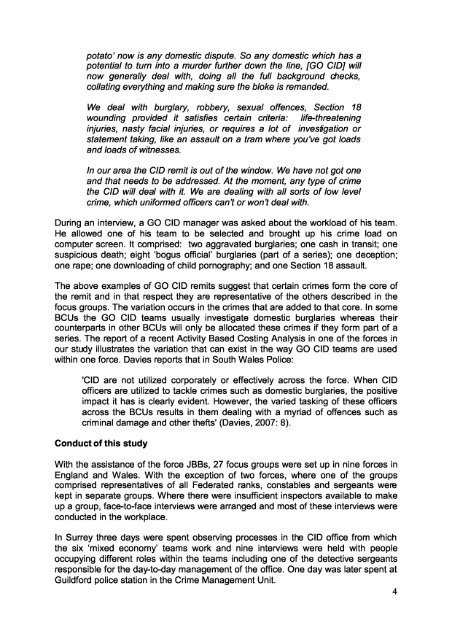LOSING THE DETECTIVES: VIEWS FROM THE ... - Police Federation
LOSING THE DETECTIVES: VIEWS FROM THE ... - Police Federation
LOSING THE DETECTIVES: VIEWS FROM THE ... - Police Federation
You also want an ePaper? Increase the reach of your titles
YUMPU automatically turns print PDFs into web optimized ePapers that Google loves.
potato’ now is any domestic dispute. So any domestic which has a<br />
potential to turn into a murder further down the line, [GO CID] will<br />
now generally deal with, doing all the full background checks,<br />
collating everything and making sure the bloke is remanded.<br />
We deal with burglary, robbery, sexual offences, Section 18<br />
wounding provided it satisfies certain criteria: life-threatening<br />
injuries, nasty facial injuries, or requires a lot of investigation or<br />
statement taking, like an assault on a tram where you’ve got loads<br />
and loads of witnesses.<br />
In our area the CID remit is out of the window. We have not got one<br />
and that needs to be addressed. At the moment, any type of crime<br />
the CID will deal with it. We are dealing with all sorts of low level<br />
crime, which uniformed officers can’t or won’t deal with.<br />
During an interview, a GO CID manager was asked about the workload of his team.<br />
He allowed one of his team to be selected and brought up his crime load on<br />
computer screen. It comprised: two aggravated burglaries; one cash in transit; one<br />
suspicious death; eight ‘bogus official’ burglaries (part of a series); one deception;<br />
one rape; one downloading of child pornography; and one Section 18 assault.<br />
The above examples of GO CID remits suggest that certain crimes form the core of<br />
the remit and in that respect they are representative of the others described in the<br />
focus groups. The variation occurs in the crimes that are added to that core. In some<br />
BCUs the GO CID teams usually investigate domestic burglaries whereas their<br />
counterparts in other BCUs will only be allocated these crimes if they form part of a<br />
series. The report of a recent Activity Based Costing Analysis in one of the forces in<br />
our study illustrates the variation that can exist in the way GO CID teams are used<br />
within one force. Davies reports that in South Wales <strong>Police</strong>:<br />
'CID are not utilized corporately or effectively across the force. When CID<br />
officers are utilized to tackle crimes such as domestic burglaries, the positive<br />
impact it has is clearly evident. However, the varied tasking of these officers<br />
across the BCUs results in them dealing with a myriad of offences such as<br />
criminal damage and other thefts' (Davies, 2007: 8).<br />
Conduct of this study<br />
With the assistance of the force JBBs, 27 focus groups were set up in nine forces in<br />
England and Wales. With the exception of two forces, where one of the groups<br />
comprised representatives of all Federated ranks, constables and sergeants were<br />
kept in separate groups. Where there were insufficient inspectors available to make<br />
up a group, face-to-face interviews were arranged and most of these interviews were<br />
conducted in the workplace.<br />
In Surrey three days were spent observing processes in the CID office from which<br />
the six ‘mixed economy’ teams work and nine interviews were held with people<br />
occupying different roles within the teams including one of the detective sergeants<br />
responsible for the day-to-day management of the office. One day was later spent at<br />
Guildford police station in the Crime Management Unit.<br />
4
















